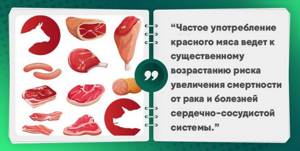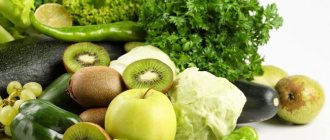Is it possible to give up meat and become a vegetarian without harm to your health? Where to begin? Many vegetarians would probably laugh kindly at this question and ask a counter question: “How can you remain a meat eater without harm to your health?”
Most people who switch to a vegetarian or vegan diet report improved health (confirmed by tests), increased performance and energy levels, notice that they look better and feel better.
Many people are aware of the benefits of vegetarianism and support it from an ethical point of view, and even try to give up meat for a while, but soon return back to old habits.
How can you become a vegetarian, so that you don’t have a painful desire to eat at least a small piece of sausage or barbecue, so that you don’t feel drawn to old habits?
How to become a vegetarian - where to start, so that it’s easy Secrets of a gentle transition to a new diet Why you can’t completely give up meat at once How to replace meat The magical properties of spices Do I need vitamins or dietary supplements Why do they always offer me meat? Personal experience: 30 years of vegetarianism 6 best recipe books for vegetarians
How to become a vegetarian - where to start to make it easy
Let’s first look at what “thin” and “dense” nutrition is. Food that is digested easily and quickly is fine nutrition, and food that takes a lot of time and energy to digest is dense nutrition. The lightest and most subtle nutrition is freshly squeezed juices. Next come fruits, berries, raw vegetables, cereals and cereals, cooked vegetables growing underground (potatoes, carrots, beets), legumes, dairy products, and finally fish and meat.
The closer a nutrient is to the sun, the easier it is to digest and the more energy it is filled with. Plants receive the energy of the sun directly, while animals receive it indirectly, so there is less subtle energy in meat. The most energy-filled foods are fresh fruits, vegetables and sprouts.
If you are used to eating meat or fish every day, you don’t need to rush into the now popular “detox” and immediately switch to juices, fruits and sprouts. Maybe you can live like this for a few days, but then it will become difficult for you - irritability will appear, everything around you will make you angry. In addition, if you suddenly switch to a very light diet, the process of cleansing the body may go too quickly, and you will not feel very good for some time.
What can a vegetarian replace meat with?
You will be drawn to meat for quite a long time. To reduce cravings, it is important to constantly replenish the reserves of all necessary microelements, otherwise the body will demand it by producing the appetite hormone - ghrelin. But even if you do not have a deficiency of important microelements, your brain will still provoke you. In this case, you need to know what can strongly resemble meat taste.
Mushroom dishes
Mushrooms can replace a portion of meat like nothing better - they are nourishing, piquant, aromatic. You can make snacks, sauces from them, add them to soup, salad, fry them with potatoes, or make them the main ingredient of pizza. Each type of mushroom has its own taste. Among the wide variety, vegans prefer champignons, porcini mushrooms, chanterelles, and oyster mushrooms.
Soy goulash
A very common substitute, it is even used in the production of sausages, small sausages, sausages, and pate to save on meat products. Soy pieces easily replace meat and are in no way inferior in taste. And if you season them, add garlic, onions and other savory ingredients, then it will be difficult to distinguish them at all.
Tofu cheese
A common product among vegans and vegetarians, it is made from soybeans and resembles mozzarella cheese. They are used as a base for many dishes, smoked, fried, and added to salads. Its taste is neutral, that is, it itself is practically tasteless, which gives it a great advantage. You can even use it to make desserts.

Eggplant
Vegans have even learned to make a good substitute from eggplant. They make excellent breaded chops, mushroom rolls, caviar, stews and much more.
Tempe
These are soybeans, but what makes them different is that they are fermented with fungal cultures. In this state, they are better absorbed by the body. Tempeh can be stewed with vegetables, fried as an alternative to bacon, or added to salads. It contains a slight bitterness, which can be easily removed by short-term steaming.
Lentils
Since ancient times it has been used as a meat substitute. Most of all, it resembles ground beef. You can use it to make cutlets, hamburgers, meatballs, meatballs, and stuff peppers.
Potato
Vegetarianism cannot be without potatoes - this is a real treasure trove of dishes with a unique taste. It can be boiled, fried, baked, stuffed. You can find hundreds of options online in combination with other healthy products. Try different recipes, even if at first glance you think it won't be to your taste.
Practical steps on the path to vegetarianism
The second most important area that every beginning vegetarian cannot do without is practice. Talent is 1% opportunity and 99% perseverance. Leading specialists and nutritionists have developed a special program to help you get used to a new diet, with less stress on the body. So, you want to become a vegetarian, where to start?
Try your favorite dishes without meat
Step #1. One of the most effective methods to fall in love with a vegetarian diet is to start trying your favorite recipes without adding meat products, but replacing them with soy goulash, beans, and lentils. Many people do not notice a significant difference, and then completely get used to this taste. At the same time, do not give up meat at all, let your brain get used to it without noticing any disadvantages. Over time, many vegetarians learned to cook so deliciously from plant ingredients that others even perceived them as meat.
Gradually reduce the amount of meat in your diet
Step #2. Gradually remove animal products, maintaining their variety. That is, still eat red meat, poultry, fish, but reduce their volume. If you are used to eating meat every day and several times, first reduce the daily portion, and then reduce the days in the week. Set specific days on which you will eat it and on which you will not. This stage may take time, even a month or even several months.
Replace meat with fish
Step #3. After there is practically no animal meat left in our diet, it’s time to replace it with fish products. Buy low-fat fish: hake, pike, perch, pike perch. You can make wonderful dishes from them. In general, you can skip this step if you do not like fish products or feel that you can do without them.
Start eliminating red meat first
Step #4. We begin the process of completely getting rid of meat. First we remove the red types, which include: pork, beef, lamb and horse meat. Let the body slowly adapt to the reduced intake of protein, fats and other microelements. Have small meals for yourself every now and then, but don't get too carried away so you don't lose control and get cravings back.

Plan your diet for the week
If you have a habit of eating snacks, this is unacceptable as a vegetarian. Now you won't be able to eat a ham sandwich, quickly fry an egg, or eat a hamburger at a fast food cafe. All this should be a thing of the past. The diet must be well planned; for this you will have to think in advance about what products to buy and what to prepare. Also, at first you will need a calorie calculator, which will tell you what is best for you to eat and in what quantity.
Eat delicious food
Some people have a stereotype that vegetarian food is not tasty. We live in the 21st century, where the availability and variety of products is very great. In addition to meat, there are a lot of delicious products. Try new recipes for yourself, don’t be afraid to improvise. Our brain must produce the hormone dopamine while eating; it is also called the hormone of happiness, which affects the feeling of satisfaction and good mood.
If you don't like the food you eat, replace it as soon as possible!
Try dishes from different countries, look for suitable recipes on the Internet. Use seasonings, because they are the real taste designers; nothing adds piquancy like spices.
Today you can cook pancakes, muffins and other desserts without eggs or milk. Find recipes and do not deny yourself the pleasure of food, on the contrary, you should feel how good it is that you are now a vegetarian, you have so many different things to choose from.
Simplify your cooking process
Of course, the cooking process can be exhausting and energy-consuming. Over time, you may want to give up this idea. But the problem can be easily circumvented if you prepare food in advance or buy semi-finished vegetable products. May you always have something in your refrigerator for this occasion. You can also always go to a cafe and order what suits you.
Reward yourself
Being a vegetarian does not mean never eating anything of animal origin in your life. Everything in life can change dramatically when your body is better off eating meat or something from dairy products and will benefit from it much more. In addition, for each completed stage, give yourself a small surprise - prepare something tasty for yourself. It’s better to eat ham, shish kebab, or chop once and forget about it for a long time, than to abstain and constantly think about them. Let there always be in your brain the thought that you are in control of everything yourself, and you can always eat what you want, you just don’t want for objective reasons. The very feeling that you are not disadvantaged means a lot.
Notice positive changes in your body
After several months of vegetarianism, you should notice positive changes in your body. For example, if you were overweight, you will notice that you have lost several kilos during this time. As a result, the cardiovascular system will experience less stress. After losing weight, you will most likely stop having pain in your joints, back, and lower back due to the reduced load on them. Also, a vegetarian diet gives you more energy, fewer problems with the stomach and intestines, and your skin will become cleaner. Notice all the positive changes in your body and life in general. This will make you more determined to continue following this diet with even more enthusiasm.
Avoid eating places
Another important tip is to stay away from eating places, cafes and restaurants. The fact is that many of them use flavorings that cause appetite and cravings for certain foods. This is a successful marketing ploy that even many people are not aware of. If you're going to a party or dinner at a restaurant, you may want to eat your food beforehand to avoid temptation.
Body examination
Before changing anything in your diet, I advise you to first undergo a complete examination of your body and consult with your doctor. Some identified diseases may delay your transition to a plant-based diet. Therefore, I recommend not to rush and approach this step consciously.

Vegan marshmallows with aquafaba at Candy bar B12
Buying groceries
Naturally, when switching from traditional cuisine to vegetarian, the ingredients for cooking also change. It is important not only to determine how to become a vegetarian, but also where to purchase products for a new diet.
We recommend starting with our list of easy vegan meals to get an idea of what ingredients you'll need. The list offers a dozen quick and easy recipes. You can find plant-based ingredients to cook with in supermarkets, natural food stores, farmers' markets and online.
Natural food stores and supermarkets
In all supermarkets you can find products for a vegetarian diet: beans, rice, pasta, soy milk, fruits, vegetables, etc. But there are better places to purchase such goods. When it comes to offering a variety of quality, fresh vegetarian products, any supermarket is second to none compared to a natural food store.
It is believed that prices in such stores are quite high. In fact, purchasing products from them is often more profitable than in supermarkets. Wholesale departments offer favorable conditions, and you can significantly reduce costs when purchasing beans, nuts, and cereals in large quantities.
Online stores
Currently, in almost every region, it is possible to place online orders from online stores specializing in vegetarian products.
Online stores offer a wide variety of plant-based products: energy bars, fortified breakfasts, cookies, nutritional yeast, dried vegetables, fruits and berries, seeds, nuts, etc. In addition, there is often a selection of vitamins and supplements, cosmetics for vegetarians, equipment and special devices for preparing vegetarian dishes. Many sites hold promotions and sales, and have special discount codes for regular customers. Some online stores offer free delivery for purchases over a certain amount.
Every year there are more such stores online. This is a convenient option for purchasing necessary goods without leaving home. In addition, a novice vegetarian has the opportunity to try new or rarely found vegetarian products in local stores.
How to replenish the microelements contained in meat?
Meat is rich in many useful microelements, but especially: protein, vitamin B12, zinc, iron, omega 3 amino acids. Their deficiency can lead to undesirable consequences. Beginning vegetarians need to learn how to balance their diet in order to replenish all the necessary supplies. Next, we present a table with a list of plant products containing the most important microcomponents.
| Microelement name | Product name/content per 100 g |
| Protein | Lentils (25 g), nuts (17-20 g), legumes (6-10 g), chickpeas (19 g), seeds (21 g), sesame seeds (21 g), green peas (5 g), broccoli (3 G). |
| Iron | Beans (72 mg), hazelnuts (51 mg), oatmeal (45 mg), mushrooms (35 mg), halva (33.2 mg), wheat cereal (31 mg), peas (20 mg), seaweed (16 mg), dried apricots (11.5 mg). |
| Zinc | Wheat germ (17 mg), sesame (10.2 mg), hemp seeds (8.8 mg), poppy seeds (7.9 mg), pumpkin seeds (7.8 mg), soy powder (6.6 mg), pine nuts (6.5 mg). |
| Vitamin B12 | Caramel, brown mushrooms, mashed potatoes, almond milk, soy. |
| Omega-3 | Flaxseed oil, hemp seeds, flax seeds, walnuts, soybean oil, beans. |
| Calcium | Spinach, seaweed, sesame, all types of nuts, flax seeds, garlic, all types of cabbage, apricot, figs, raisins. |
It is important to note that vitamin B12 is found in rather small quantities in plant foods; vegetarians need to take methylcobalamin as a supplement to avoid deficiency of this important vitamin, preventing the development of anemia.
As for Omega-3, plant foods contain only alpha lipoic acid (ALA), the other two most important acids EPA and DHA can be converted from it, but only 15-20% of its amount. This also serves as a signal for the development of a deficiency of these acids.
How can a vegetarian substitute eggs for baking?
For many, giving up eggs themselves is not difficult, but they are often a mandatory component for various recipes, such as pancakes, pastries, cutlets, potato pancakes, meatballs, and omelettes. Fortunately, nowadays eggs can be easily replaced. Here are some egg substitutes for vegetarians:
- Flax seeds . For preparation you will need 1 tablespoon of flax seed flour, 3 tablespoons of water.
- Aquafaba . The liquid left over from cooking beans. You can make it yourself, or drain it from a can of canned peas. 30 ml replaces one egg.
- Starch . It has sufficient viscosity to hold cutlets and meatballs together and is used in baking. To prepare, you need water and starch in combination, for 1 serving of starch - 2 servings of water. One tablespoon will replace one egg.
- Semolina . 3 tablespoons of semolina replace a full egg. Can be added to baked goods, casseroles, cutlets.
- Agar-agar . 1 tablespoon will be enough.
- Peanut butter . Used for baking, makes it softer.
Protein for vegetarians
A completely natural question for those who have switched to vegetarianism is where to get protein, which the body cannot do without. In fact, replacing animal proteins is quite possible. proteins it needs .
Protein is important for many reasons. First of all, it is a source of essential acids that are important for the functioning of the body. In addition, protein helps restore muscles and allows a person to feel full faster. Vegetarians should pay attention to the following foods that contain a lot of protein:
- Soy products, particularly soy milk - one glass of this product contains approximately 8 g of protein. It is also recommended to consume tofu, which is essentially a versatile food.
- Quinoa is a source of complete protein with all the amino acids . This cereal is nutritious and very healthy.
- Peas, white beans, beans - help reduce cholesterol and saturate the body with vegetable proteins.
- Lentils are a source of folic acid.
- Nuts and nut butters are a source of protein and healthy monounsaturated fats.
- Black beans are high in protein and fiber.
- Broccoli is low in calories and relatively high in fiber and protein.
All of these foods should be combined with other vegetarian foods.
Is it possible to follow this diet plan for children?

As a rule, the beginning of vegetarianism occurs in adulthood, when a person, for medical reasons or personal reasons, refuses food of animal origin. But is it possible to limit a child?
In fact, doctors and experts do not recommend switching a baby to a plant-based diet, since a growing body simply needs proteins, minerals and vitamins (for example, vitamin D deficiency leads to the development of rickets). As a last resort, you can exclude meat from the child’s diet, but you should definitely leave milk, cheese, cottage cheese, eggs, and fermented milk products, which are a source of not only proteins, but also calcium. And, of course, do not forget about taking additional vitamin complexes.










